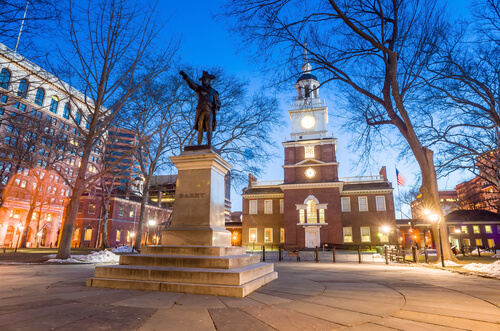Ricochet is the best place on the internet to discuss the issues of the day, either through commenting on posts or writing your own for our active and dynamic community in a fully moderated environment. In addition, the Ricochet Audio Network offers over 50 original podcasts with new episodes released every day.
 Constitution Day Outside Philadelphia
Constitution Day Outside Philadelphia
 I write from Villanova University where I gave a Constitution Day talk this afternoon. When the video goes up, I will post it here. In the meantime, I direct your attention to this morning’s Philadelphia Inquirer, which published an op-ed I wrote as a teaser. Here is how it began:
I write from Villanova University where I gave a Constitution Day talk this afternoon. When the video goes up, I will post it here. In the meantime, I direct your attention to this morning’s Philadelphia Inquirer, which published an op-ed I wrote as a teaser. Here is how it began:
Sept. 17 marks Constitution Day. In Philadlephia, 228 years ago, George Washington and his fellow delegates subscribed their names to a copy of the proposed constitution. They hoped the states would call conventions to consider the document and that at least nine would ratify it and summon into existence what they described in the preamble as “a more perfect Union,” which would “establish Justice, insure domestic Tranquility, provide for the common defence, promote the general Welfare, and secure the Blessings of Liberty” to themselves and their “Posterity.”
As this language suggests, nearly all of those who had attended the federal convention had high hopes. None, however, were certain that the proposed constitution would suffice. They were, they knew, engaged in an experiment.
It was an open question whether self government and good government were compatible. Republican government — as instanced in classical Greece, in ancient Rome, and in 17th-century England — did not have an unblemished record. It was their contention — and hope — that the instrument of government under consideration constituted a decisive improvement on all prior political models.
I am of the opinion that the jury is still out regarding the experiment initiated by the Framers in 1787.
Published in General



I wish I’d known! I would have been there.
Did the experiment fail us or did we fail the experiment?
A working link here.
I fear we failed it, Brent. We allowed too much power to be concentrated in the Executive branch, and the watchdogs of the Legislative branch failed to zealously guard their prerogatives.
It worked better and longer than a lot of people had expected. It would have been nice to get more than the two centuries of reasonably good government, though.
If the choice is between the old Articles of Confederation and the new Constitution, I think the Constitution wins. But maybe some other compromise would have been better. Hard to say.
Getting the Constitution ratified was somewhat of a railroad job, somewhat like the way ObamaCare was rammed through. But the opponents couldn’t agree on an alternative, similar to the way the opponents of ObamaCare cannot agree on an alternative now.
The Founders were perfectly clear-eyed about how human beings interact with and around political power.
Consequently, there’s nothing happening today that the Founders failed to imagine could happen or failed to provide a viable, Constitutional mechanism to address.
They would be stunned, however, at how little action we are taking to rebalance power between Washington, the state capitols, and the individual.
They would remind us that in Article V they gave us all the tools we need to correct this imbalance. They believed that the States must have the capability to amend the Constitution without any interference from the federal government, which someday itself could be every bit as onerous as King George III’s monarchy. So they left us the means to do that in Article V.
It’s referred to in the constitution as “a Convention for proposing Amendments,” but in common parlance we know it as a “convention of states” or an “Article V convention.”
Let’s stop sniveling and just get on with it.
Some of us have started but we can’t do this without you; please join us here: Convention of States Project.
I apologize for the temporary disappearance of this post. For some reason, the link to the Philadelphia Inquirer was defective, and editing it, as I did, did not fix the defect.